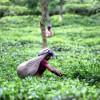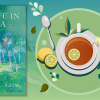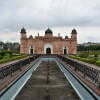A love affair with tea
I wonder what it is in a cup of tea that makes it so invigorating. The obvious answer would be the stimulant, caffeine, or the particular flavour of the leaves seeping into the hot water and the aroma that takes over your senses.
For me it is the total process of brewing the tea just right that is so therapeutic. Black tea is what I enjoy but our deshi favourite is milk tea in strong liquor -- it is steeped tea leaves in boiling water.

My tea adventure and search for the best tea in Bangladesh takes me to this tea season's first tea auction in the port city, which for me is a first and I was in for a treat. The hall room ambience of Chattogram Tea Auction Centre in Agrabad is electrifying; the suave auctioneer calls out the numbers, in impeccable English and talking in perfect Bangla at a speed which gives it all a sense of urgency. The traders hark their choice and place competitive bids until the auctioneer slams his hammer to declare the sale. The chosen tea lots, which means roughly 499.2 kilos of tea per lot, are finally sold to the highest bidder.
Each sack has 50kg of tea and 10 such sacks together make a lot; a lot has 500 kg tea from where one kg is given away for sampling to traders and tea tasters, so each tea lot in the auction weighs 499kg.
Tea auctions are held every Monday during each tea season and the peak of tea season is in monsoon from July through September and just so that you know, tea produced during winter months are considered slightly below par. A record total of 102.92 million kg of tea has been produced in 2023 from 168 big and small tea gardens in the country, surpassing all previous records of tea production, according to Bangladesh Tea Board. Here, our local tea manufacturers, throughout Bangladesh, sell in bulk to buyers through an open auction. Tea leaves, by the way, come from the two species of plants called Camellia Sinensis and Camellia Assamica.

"The tea trade has recently experienced a downfall. I am in the tea business for the last 17 years and an auctioneer for last 10 years. It is my passion, I have seen robust market and weak markets and unfortunately the last three years the business could not flourish like yester years," says Md Musfique Kamal, executive director, KS Brokers and Tea Auctioneer.
"We are facing stiff competition in the world market from Sri Lanka, Kenya and other countries. The worldwide tea production is surplus now; thus, prices are down. These countries mass produce for commercial purpose and sell at low prices in the global market. They have excellent marketing schemes. Our tea trade suffers from production inconsistency, prices not being competitive and not meeting the standardised global packaging norms. Moreover, we do not mass produce so we cannot lower the cost."
"Our gardens are nature dependent, where soil conditions, weather conditions, heat factor, all count for good grade tea. When we send a sample to a tea trader in the global platform, we lack quality consistency. We send samples for approval. When approved, these are packaged into the final lot that we send after the deal is finalised," he added.
Bangladesh's tea industry is regulated under the supervision of the Bangladesh Tea Board, who governs Tea Traders Association of Bangladesh and Bangladesh Tea Association .
Tea Traders Association of Bangladesh (TTAB) is responsible for organising and controlling the tea auction ensuring transparency as far as sales go. The tea auction and the sale are conducted by Tea Brokers, and under TTAB there are seven authorised tea brokers. I have been graciously invited by KS Brokers to be part of this frenzied tea auction.

"First of all, the tea produced in the gardens is sent to our bonded warehouses which are mostly located in Chattogram. Later, the tea brokers receive a sample of the tea lot and taste the tea. Tea tasting is the process in which a trained taster determines the quality of a particular tea. Tea tasters use their senses to analyse the five items; shape and size of tea, colour and gloss, colour of the liquid, aroma of the liquid, and taste of the liquid. Each lot is given a numerical value rating from 1 to 5 by tasting the strong liquor for pungency, bitterness, sweetness and aroma and the feeling the tea taster gets.
"Then, the tea brokers prepare catalogues adding the tentative valuation price range of a particular tea lot. Later, the catalogues and valuation copies are dispatched to all the buyers ahead of the weekly auctions. The buyers too taste the tea and decide which lot to bid on. Then, the traders take part in the auctions and purchase tea. Finally, the tea reaches the retailers and consumers," explains ASM Shahidullah Shajahan, managing director of KS Brokers.

Tea tasting is an interesting task, tea samples are kept in a room at the auction centre and there are hundreds of tin canisters with different grades of tea from tea estates all over the country. A small scale weighs a gram of tea against the weight of a 25 paisa coin. Hot boiling water is poured over the tea leaves and left to brew for three and a half to six minutes. The experienced tea taster pulls in his stomach and using a large spoon noisily slurps the scorching sip to differentiate the soul of the tea, whether it is earthy, grassy, flowery. The tea is passed over the tongue, for an even taste profile. The liquid is then usually expelled into a spittoon before the taster moves on to the next sample.
"Grade, bitterness, aroma, pungency of the liquor before and after pouring milk is determined by a tea taster. A tea gold ring is seen after brewing the leaves for three minutes or more and only the 4 double plus rating teas show this ring," says Md Nasir Uddin Khan, a tea planter and retailer, who explains and shows the grandly ceremonial tasting process.
Black tea is earthy and sweet while green tea has a grassy scent, herbal teas smell of their respective flavour. OP or Orange Pekoe is the highest grade given to manufactured tea, when brewed its flavour has a delicate fragrance and tastes wonderfully delicious and the liquors are light and pale amber in colour. In Bangladesh the best tea with a four plus value comes from Kaiyachreea Dalu Tea Estate, in Bhujpur, Fatikchhari, Chattogram. Kaiyacherra Tea Garden is managed by the BRAC Tea Estate, and traders buy this for Tk 600 a kg from tea auctions.
Then there is Lohani and Madhupur tea selling at Tk 1,000 each at tea auctions. These are all single estate teas fancied by tea connoisseurs.
"The tea blending is done only before packaging to be sold to the market. A minimum of three grades of tea with light, strong and pungent flavour are blended to be sold at a lower price. A regular customer will not go for single estate, four plus teas which are expensive items even at auctions. However, blends can skilfully be crafted with premium ingredients to add to the flavour profile," says Shahidullah Shajahan adding that the tea plucking is an art form mixed with drama, for there are very special teas that are plucked only on full moon nights during the last two weeks of October.
Moonlight plucking is a ceremonial ritual when the air's high oxygen content and the full moon's cosmic confluence produces a delicate, smoother tea-leaf taste. Then there are the silver tips which are actually the delicate leaf-buds at the point of unfurling. The most prized of all is "white tea", which is full of antioxidants more than other teas.

Our Halda Valley tea estate produces both the white and silver tips tea in Bangladesh. Bangladesh tea board has a special tea called BT-2 and also offers local green tea.
"The tea market dynamics depends heavily on quality grade tea, and almost 80 percent of quality is ensured in the garden it grows and 20 percent on the factory -- where 70 percent moisture is taken out of leaves by withering," adds Md Nasir Uddin Khan.
In spite of our shortcomings the market size of the industry was Tk 3,500 crore in 2021 and Bangladesh is an important tea-producing country. It is the 12th largest tea producer in the world.
From the time the scheming East India Company initiated its tea trade in the hills of the Sylhet and Chattogram to today's gourmet teas of Halda Valley, a Bangladeshi's love for tea is eternal.

 For all latest news, follow The Daily Star's Google News channel.
For all latest news, follow The Daily Star's Google News channel. 







Comments